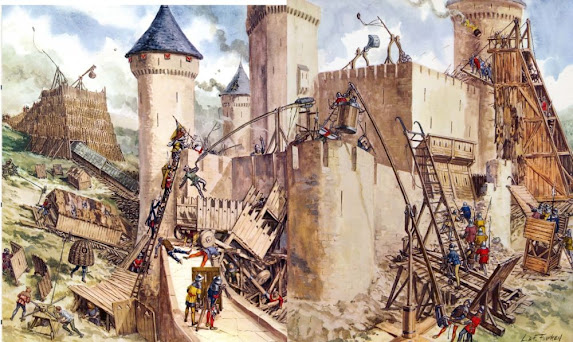In late June 1265 the town of Gloucester surrendered to the royalists after a siege of three weeks. Robert of Gloucester, a local chronicler, describes the terms of surrender:
“And Sir Edward gave them life and limb, and yet more grace,
Their arms, and all other things, and their horses each one.
Then Grimbauld Pauncefoot turned to Edward anon,
And was made knight, and bore arms against Sir Simon”.
Grimbauld was one of many Montfortian barons who submitted to the future king, were granted mercy, and served Edward for the remainder of their lives. None of them are to be found among his political opponents, even when he rode roughshod over the Great Charter. This would suggest that Simon's baronial followers were very far from proto-democrats, inspired by love of the common man. What they wanted was effective leadership at the top. Henry III could not supply that, Edward I could.
They were also after material rewards. On 18 January 1266, a few months after his surrender, Grimbauld secured the marriage of Sybil Turbeville, daughter of Robert, lord of Crickhowell on the Welsh March. When Robert went on crusade and failed to return, the lordship passed to Grimbauld.
It should not have. Robert left two sons, Hugh and Thomas. Hugh had been enfeoffed (formally granted) Crickhowell long before his father left for the Holy Land. Even so, the lordship went to Grimbauld. He was definitely in possession by November 1275, when a merchant of Chartres acquitted Hugh Turbervill of his debts for Crickhowell, and declared that in future he would look to Grimbauld for payment. Hugh was appointed constable of Castell y Bere in 1290, but this was small beans by comparison.
His younger brother Thomas was a famous traitor, who defected to the French after being captured in Gascony. In 1295 he drew up a detailed report, which still survives, advising the French king how to invade and conquer England. Interestingly, the report states that the Welsh are ready to rise under the leadership of a certain Morgan:
“...if those of Scotland rise against the King of England, the Welsh will rise also. And this I have well contrived, and Morgan has fully covenanted with me to that effect.”
This can only be Morgan ap Maredudd of Glamorgan, since there was no other prominent Welsh leader of that name at the time. After several months of spying in England and the Marches, Thomas was arrested and executed at Smithfield. It may be that Thomas held a grudge against the king for the loss of his inheritance, which explains his actions.
Amazingly, his co-conspirator, Morgan, suffered no punishment. Morgan had also emerged unscathed from the previous Welsh war of 1283, where he appears among the last followers of Prince Dafydd's council. Every other member of the council was either killed or imprisoned.
Not Morgan. Every time, he came out smelling of roses. We know he worked as the king's spy in later years; he had probably always been in royal service, and acted as agent provocateur in the Turbeville affair.
No plaques for Morgan, one suspects.

No comments:
Post a Comment